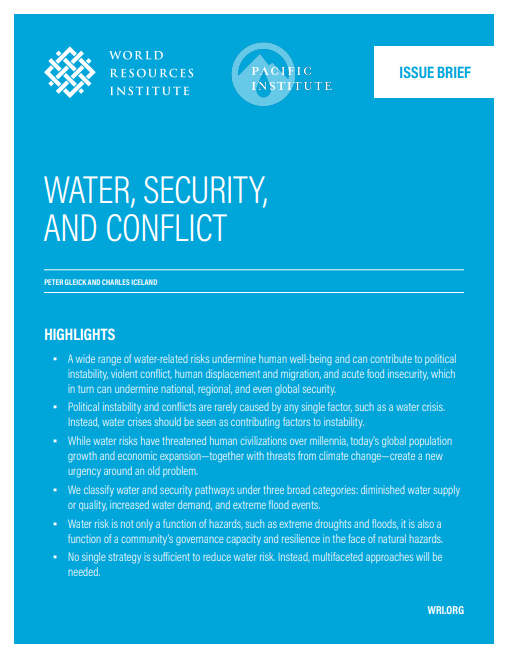Underscores the connection between water-related risks and conflict, migration, and food insecurity. It segments water and security pathways into three categories: decreased water supply or quality, increased water demand, and extreme flood events. Furthermore, the report stresses that hazards, community governance capacity, and resilience determine water risk.
It advocates for multifaceted strategies to mitigate water risk. These strategies include setting water demand limits, upgrading inefficient irrigation systems, establishing social safety net programs, decreasing global food loss and waste, and investing in wastewater treatment and reuse technologies. Also, it explores the role of the Water, Peace and Security (WPS) Partnership in devising innovative tools to identify and tackle water-related security risks. One such tool is the WPS Global Early Warning tool. This tool enables actors to pinpoint conflict hotspots before violence breaks out and to prioritize areas for water interventions.
Overview
Water in a Dynamic World
Discusses the evolving water resource challenges in our rapidly changing global landscape. It notably highlights the increasing water demand, a consequence of population growth and economic development, inevitably leading to heightened competition for limited water supplies.
Notably, the section emphasizes the interconnected nature of water issues, noting that water scarcity, pollution, and mismanagement can have far-reaching impacts, affecting ecosystems, economies, and societies. Lastly, it underscores the critical importance of adopting sustainable water management practices. Such practices are necessary to address these multifaceted challenges and ensure water security for both present and future generations.
A Water and Security Classification System
Introduces a framework for understanding the complex relationship between water and security. It outlines various pathways, such as diminished water supply or quality, increased water demand, and extreme flood events, through which water risks can lead to insecurity.
In addition, the section emphasizes the crucial role of considering governance capacity, infrastructure, and institutional strength when determining the likelihood of water-related conflicts, migration, or food insecurity. By systematically categorizing these pathways and subpathways, the classification system effectively provides a structured approach to analyzing and addressing water-related risks to global security.
Reducing Water-Related Risks to Global Security
Presents a range of strategies and options for mitigating water-related risks and enhancing global security. Firstly, it highlights the importance of proactive measures such as imposing water demand caps. Additionally, it suggests adopting efficient irrigation technologies, promoting water-efficient crops, and implementing urban water conservation measures.
Furthermore, the section emphasizes the significance of investing in wastewater treatment and reuse technologies. It also promotes negotiating watershed agreements, strengthening governance systems, and protecting natural capital like forests and wetlands. By outlining these risk-reducing options, the section provides a comprehensive approach to addressing water challenges and safeguarding global security in the face of increasing water risks.
Concluding Observations
Summarizes the key points discussed on water, security, and conflict. It encapsulates the main findings and suggestions, underlining the necessity to address water-related risks to global security. The interconnected nature of water issues, the ways water risks can lead to insecurity and conflict, and the proposed strategies for risk reduction are reiterated. The importance of international cooperation, sustainable water management practices, and governance in alleviating water-related challenges are also emphasized.




